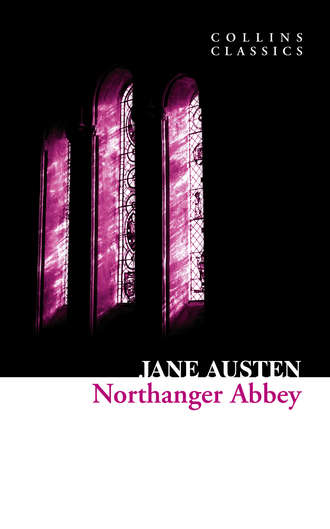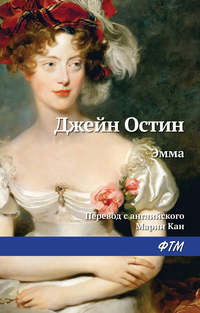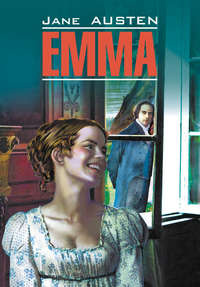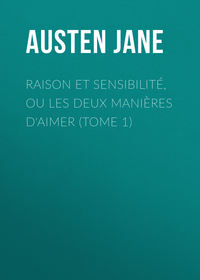
Полная версия
Northanger Abbey
‘Yes, pretty well; but are they all horrid, are you sure they are all horrid?’
‘Yes, quite sure; for a particular friend of mine, a Miss Andrews, a sweet girl, one of the sweetest creatures in the world, has read every one of them. I wish you knew Miss Andrews, you would be delighted with her. She is netting herself the sweetest cloak you can conceive. I think her as beautiful as an angel, and I am so vexed with the men for not admiring her! I scold them all amazingly about it.’
‘Scold them! Do you scold them for not admiring her?’
‘Yes, that I do. There is nothing I would not do for those who are really my friends. I have no notion of loving people by halves; it is not my nature. My attachments are always excessively strong. I told Captain Hunt at one of our assemblies this winter that if he was to tease me all night, I would not dance with him, unless he would allow Miss Andrews to be as beautiful as an angel. The men think us incapable of real friendship, you know, and I am determined to show them the difference. Now, if I were to hear anybody speak slightingly of you, I should fire up in a moment: but that is not at all likely, for you are just the kind of girl to be a great favourite with the men.’
‘Oh, dear!’ cried Catherine, colouring. ‘How can you say so?’
‘I know you very well; you have so much animation, which is exactly what Miss Andrews wants, for I must confess there is something amazingly insipid about her. Oh! I must tell you, that just after we parted yesterday, I saw a young man looking at you so earnestly – I am sure he is in love with you.’ Catherine coloured, and disclaimed again. Isabella laughed. ‘It is very true, upon my honour, but I see how it is; you are indifferent to everybody’s admiration, except that of one gentleman, who shall be nameless. Nay, I cannot blame you’ – speaking more seriously – ‘your feelings are easily understood. Where the heart is really attached, I know very well how little one can be pleased with the attention of anybody else. Everything is so insipid, so uninteresting, that does not relate to the beloved object! I can perfectly comprehend your feelings.’
‘But you should not persuade me that I think so very much about Mr Tilney, for perhaps I may never see him again.’
‘Not see him again! My dearest creature, do not talk of it. I am sure you would be miserable if you thought so!’
‘No, indeed, I should not. I do not pretend to say that I was not very much pleased with him; but while I have Udolpho to read, I feel as if nobody could make me miserable. Oh! The dreadful black veil! My dear Isabella, I am sure there must be Laurentina’s skeleton behind it.’
‘It is so odd to me, that you should never have read Udolpho before; but I suppose Mrs Morland objects to novels.’
‘No, she does not. She very often reads Sir Charles Grandison herself; but new books do not fall in our way.’
‘Sir Charles Grandison! That is an amazing horrid book, is it not? I remember Miss Andrews could not get through the first volume.’
‘It is not like Udolpho at all; but yet I think it is very entertaining.’
‘Do you indeed! You surprise me; I thought it had not been readable. But, my dearest Catherine, have you settled what to wear on your head tonight? I am determined at all events to be dressed exactly like you. The men take notice of that sometimes, you know.’
‘But it does not signify if they do,’ said Catherine, very innocently.
‘Signify! Oh, heavens! I make it a rule never to mind what they say. They are very often amazingly impertinent if you do not treat them with spirit, and make them keep their distance.’
‘Are they? Well, I never observed that. They always behave very well to me.’
‘Oh! They give themselves such airs. They are the most conceited creatures in the world, and think themselves of so much importance! By the by, though I have thought of it a hundred times, I have always forgot to ask you what is your favourite complexion in a man. Do you like them best dark or fair?’
‘I hardly know. I never much thought about it. Something between both, I think. Brown – not fair, and – and not very dark.’
‘Very well, Catherine. That is exactly he. I have not forgot your description of Mr Tilney – “a brown skin, with dark eyes, and rather dark hair”. Well, my taste is different. I prefer light eyes, and as to complexion – do you know – I like a sallow better than any other. You must not betray me, if you should ever meet with one of your acquaintance answering that description.’
‘Betray you! What do you mean?’
‘Nay, do not distress me. I believe I have said too much. Let us drop the subject.’
Catherine, in some amazement, complied, and after remaining a few moments silent, was on the point of reverting to what interested her at that time rather more than anything else in the world, Laurentina’s skeleton, when her friend prevented her, by saying, ‘For heaven’s sake! Let us move away from this end of the room. Do you know, there are two odious young men who have been staring at me this half hour. They really put me quite out of countenance. Let us go and look at the arrivals. They will hardly follow us there.’
Away they walked to the book; and while Isabella examined the names, it was Catherine’s employment to watch the proceedings of these alarming young men.
‘They are not coming this way, are they? I hope they are not so impertinent as to follow us. Pray let me know if they are coming. I am determined I will not look up.’
In a few moments Catherine, with unaffected pleasure, assured her that she need not be longer uneasy, as the gentlemen had just left the Pump-room.
‘And which way are they gone?’ said Isabella, turning hastily round. ‘One was a very good-looking young man.’
‘They went towards the church-yard.’
‘Well, I am amazingly glad I have got rid of them! And now, what say you to going to Edgar’s Buildings with me, and looking at my new hat? You said you should like to see it.’
Catherine readily agreed. ‘Only,’ she added, ‘perhaps we may overtake the two young men.’
‘Oh! Never mind that. If we make haste, we shall pass by them presently, and I am dying to show you my hat.’
‘But if we only wait a few minutes, there will be no danger of our seeing them at all.’
‘I shall not pay them any such compliment, I assure you. I have no notion of treating men with such respect. That is the way to spoil them.’
Catherine had nothing to oppose against such reasoning; and therefore, to show the independence of Miss Thorpe, and her resolution of humbling the sex, they set off immediately as fast as they could walk, in pursuit of the two young men.
CHAPTER 7
Half a minute conducted them through the Pump-yard to the archway, opposite Union Passage; but here they were stopped. Everybody acquainted with Bath may remember the difficulties of crossing Cheap Street at this point; it is indeed a street of so impertinent a nature, so unfortunately connected with the great London and Oxford roads, and the principal inn of the city, that a day never passes in which parties of ladies, however important their business, whether in quest of pastry, millinery, or even (as in the present case) of young men, are not detained on one side or other by carriages, horsemen, or carts. This evil had been felt and lamented, at least three times a day, by Isabella since her residence in Bath; and she was now fated to feel and lament it once more, for at the very moment of coming opposite to Union Passage, and within view of the two gentlemen who were proceeding through the crowds, and threading the gutters of that interesting alley, they were prevented crossing by the approach of a gig, driven along on bad pavement by a most knowing-looking coachman with all the vehemence that could most fitly endanger the lives of himself, his companion, and his horse.
‘Oh, these odious gigs!’ said Isabella, looking up. ‘How I detest them.’ But this detestation, though so just, was of short duration, for she looked again and exclaimed, ‘Delightful! Mr Morland and my brother!’
‘Good heaven! ’Tis James!’ was uttered at the same moment by Catherine; and, on catching the young men’s eyes, the horse was immediately checked with a violence which almost threw him on his haunches, and the servant having now scampered up, the gentlemen jumped out, and the equipage was delivered to his care.
Catherine, by whom this meeting was wholly unexpected, received her brother with the liveliest pleasure; and he, being of a very amiable disposition, and sincerely attached to her, gave every proof on his side of equal satisfaction, which he could have leisure to do, while the bright eyes of Miss Thorpe were incessantly challenging his notice; and to her his devoirs were speedily paid, with a mixture of joy and embarrassment which might have informed Catherine, had she been more expert in the development of other people’s feelings, and less simply engrossed by her own, that her brother thought her friend quite as pretty as she could do herself.
John Thorpe, who in the meantime had been giving orders about the horses, soon joined them, and from him she directly received the amends which were her due; for while he slightly and carelessly touched the hand of Isabella, on her he bestowed a whole scrape and half a short bow. He was a stout young man of middling height, who, with a plain face and ungraceful form, seemed fearful of being too handsome unless he wore the dress of a groom, and too much like a gentleman unless he were easy where he ought to be civil, and impudent where he might be allowed to be easy. He took out his watch: ‘How long do you think we have been running it from Tetbury, Miss Morland?’
‘I do not know the distance.’ Her brother told her that it was twenty-three miles.
‘Three and twenty!’ cried Thorpe. ‘Five and twenty if it is an inch.’ Morland remonstrated, pleaded the authority of road-books, innkeepers, and milestones; but his friend disregarded them all; he had a surer test of distance. ‘I know it must be five and twenty,’ said he, ‘by the time we have been doing it. It is now half after one; we drove out of the inn-yard at Tetbury as the town clock struck eleven; and I defy any man in England to make my horse go less than ten miles an hour in harness; that makes it exactly twenty-five.’
‘You have lost an hour,’ said Morland; ‘it was only ten o’clock when we came from Tetbury.’
‘Ten o’clock! It was eleven, upon my soul! I counted every stroke. This brother of yours would persuade me out of my senses, Miss Morland; do but look at my horse; did you ever see an animal so made for speed in your life?’ (The servant had just mounted the carriage and was driving off.) ‘Such true blood! Three hours and a half indeed coming only three and twenty miles! Look at that creature, and suppose it possible if you can.’
‘He does look very hot, to be sure.’
‘Hot! He had not turned a hair till we came to Walcot Church; but look at his forehand; look at his loins; only see how he moves; that horse cannot go less than ten miles an hour: tie his legs and he will get on. What do you think of my gig, Miss Morland? A neat one, is not it? Well hung; town-built; I have not had it a month. It was built for a Christchurch man, a friend of mine, a very good sort of fellow; he ran it a few weeks, till, I believe, it was convenient to have done with it. I happened just then to be looking out for some light thing of the kind, though I had pretty well determined on a curricle too; but I chanced to meet him on Magdalen Bridge, as he was driving into Oxford, last term: ‘Ah! Thorpe,’ said he, ‘do you happen to want such a little thing as this? It is a capital one of the kind, but I am cursed tired of it.’ ‘Oh! D—,’ said I; ‘I am your man; what do you ask?’ And how much do you think he did, Miss Morland?’
‘I am sure I cannot guess at all.’
‘Curricle-hung, you see; seat, trunk, sword-case, splashing-board, lamps, silver moulding, all you see complete; the ironwork as good as new, or better. He asked fifty guineas; I closed with him directly, threw down the money, and the carriage was mine.’
‘And I am sure,’ said Catherine, ‘I know so little of such things that I cannot judge whether it was cheap or dear.’
‘Neither one nor t’other; I might have got it for less, I dare say; but I hate haggling, and poor Freeman wanted cash.’
‘That was very good-natured of you,’ said Catherine, quite pleased.
‘Oh! D—it, when one has the means of doing a kind thing by a friend, I hate to be pitiful.’
An inquiry now took place into the intended movements of the young ladies; and, on finding whither they were going, it was decided that the gentlemen should accompany them to Edgar’s Buildings, and pay their respects to Mrs Thorpe. James and Isabella led the way; and so well satisfied was the latter with her lot, so contentedly was she endeavouring to ensure a pleasant walk to him who brought the double recommendation of being her brother’s friend, and her friend’s brother, so pure and uncoquettish were her feelings, that, though they overtook and passed the two offending young men in Milsom Street, she was so far from seeking to attract their notice, that she looked back at them only three times.
John Thorpe kept of course with Catherine, and, after a few minutes’ silence, renewed the conversation about his gig. ‘You will find, however, Miss Morland, it would be reckoned a cheap thing by some people, for I might have sold it for ten guineas more the next day; Jackson, of Oriel, bid me sixty at once; Morland was with me at the time.’
‘Yes,’ said Morland, who overheard this; ‘but you forget that your horse was included.’
‘My horse! Oh, D—it! I would not sell my horse for a hundred. Are you fond of an open carriage, Miss Morland?’
‘Yes, very; I have hardly ever an opportunity of being in one; but I am particularly fond of it.’
‘I am glad of it; I will drive you out in mine every day.’
‘Thank you,’ said Catherine, in some distress, from a doubt of the propriety of accepting such an offer.
‘I will drive you up Lansdown Hill tomorrow.’
‘Thank you; but will not your horse want rest?’
‘Rest! He has only come three and twenty miles today; all nonsense; nothing ruins horses so much as rest; nothing knocks them up so soon. No, no; I shall exercise mine at the average of four hours every day while I am here.’
‘Shall you indeed!’ said Catherine very seriously. ‘That will be forty miles a day.’
‘Forty! Aye, fifty, for what I care. Well, I will drive you up Lansdown tomorrow; mind, I am engaged.’
‘How delightful that will be!’ cried Isabella, turning round. ‘My dearest Catherine, I quite envy you; but I am afraid, brother, you will not have room for a third.’
‘A third indeed! No, no; I did not come to Bath to drive my sisters about; that would be a good joke, faith! Morland must take care of you.’
This brought on a dialogue of civilities between the other two; but Catherine heard neither the particulars nor the result. Her companion’s discourse now sunk from its hitherto animated pitch to nothing more than a short decisive sentence of praise or condemnation on the face of every woman they met; and Catherine, after listening and agreeing as long as she could, with all the civility and deference of the youthful female mind, fearful of hazarding an opinion of its own in opposition to that of a self-assured man, especially where the beauty of her own sex is concerned, ventured at length to vary the subject by a question which had been long uppermost in her thoughts; it was, ‘Have you ever read Udolpho, Mr Thorpe?’
‘Udolpho! Oh, Lord! Not I; I never read novels; I have something else to do.’
Catherine, humbled and ashamed, was going to apologize for her question, but he prevented her by saying, ‘Novels are all so full of nonsense and stuff; there has not been a tolerably decent one come out since Tom Jones, except The Monk; I read that t’other day; but as for all the others, they are the stupidest things in creation.’
‘I think you must like Udolpho, if you were to read it; it is so very interesting.’
‘Not I, faith! No, if I read any, it shall be Mrs Radcliffe’s; her novels are amusing enough; they are worth reading; some fun and nature in them.’
‘Udolpho was written by Mrs Radcliffe,’ said Catherine, with some hesitation, from the fear of mortifying him.
‘No sure; was it? Aye, I remember, so it was; I was thinking of that other stupid book, written by that woman they make such a fuss about, she who married the French emigrant.’
‘I suppose you mean Camilla?’
‘Yes, that’s the book; such unnatural stuff! An old man playing at see-saw! I took up the first volume once and looked it over, but I soon found it would not do; indeed I guessed what sort of stuff it must be before I saw it: as soon as I heard she had married an emigrant, I was sure I should never be able to get through it.’
‘I have never read it.’
‘You had no loss, I assure you; it is the horridest nonsense you can imagine; there is nothing in the world in it but an old man’s playing at see-saw and learning Latin; upon my soul there is not.’
This critique, the justness of which was unfortunately lost on poor Catherine, brought them to the door of Mrs Thorpe’s lodgings, and the feelings of the discerning and unprejudiced reader of Camilla gave way to the feelings of the dutiful and affectionate son, as they met Mrs Thorpe, who had descried them from above, in the passage. ‘Ah, Mother! How do you do?’ said he, giving her a hearty shake of the hand. ‘Where did you get that quiz of a hat? It makes you look like an old witch. Here is Morland and I come to stay a few days with you, so you must look out for a couple of good beds somewhere near.’ And this address seemed to satisfy all the fondest wishes of the mother’s heart, for she received him with the most delighted and exulting affection. On his two younger sisters he then bestowed an equal portion of his fraternal tenderness, for he asked each of them how they did, and observed that they both looked very ugly.
These manners did not please Catherine; but he was James’s friend and Isabella’s brother; and her judgement was further bought off by Isabella’s assuring her, when they withdrew to see the new hat, that John thought her the most charming girl in the world, and by John’s engaging her before they parted to dance with him that evening. Had she been older or vainer, such attacks might have done little; but, where youth and diffidence are united, it requires uncommon steadiness of reason to resist the attraction of being called the most charming girl in the world, and of being so very early engaged as a partner; and the consequence was that, when the two Morlands, after sitting an hour with the Thorpes, set off to walk together to Mr Allen’s, and James, as the door was closed on them, said, ‘Well, Catherine, how do you like my friend Thorpe?’ instead of answering, as she probably would have done, had there been no friendship and no flattery in the case, ‘I do not like him at all,’ she directly replied, ‘I like him very much; he seems very agreeable.’
‘He is as good-natured a fellow as ever lived; a little of a rattle; but that will recommend him to your sex, I believe: and how do you like the rest of the family?’
‘Very, very much indeed: Isabella particularly.’
‘I am very glad to hear you say so; she is just the kind of young woman I could wish to see you attached to; she has so much good sense, and is so thoroughly unaffected and amiable; I always wanted you to know her; and she seems very fond of you. She said the highest things in your praise that could possibly be; and the praise of such a girl as Miss Thorpe even you, Catherine,’ taking her hand with affection, ‘may be proud of.’
‘Indeed I am,’ she replied; ‘I love her exceedingly, and am delighted to find that you like her too. You hardly mentioned anything of her when you wrote to me after your visit there.’
‘Because I thought I should soon see you myself. I hope you will be a great deal together while you are in Bath. She is a most amiable girl; such a superior understanding! How fond all the family are of her; she is evidently the general favourite; and how much she must be admired in such a place as this – is not she?’
‘Yes, very much indeed, I fancy; Mr Allen thinks her the prettiest girl in Bath.’
‘I dare say he does; and I do not know any man who is a better judge of beauty than Mr Allen. I need not ask you whether you are happy here, my dear Catherine; with such a companion and friend as Isabella Thorpe, it would be impossible for you to be otherwise; and the Allens, I am sure, are very kind to you?’
‘Yes, very kind; I never was so happy before; and now you are come it will be more delightful than ever; how good it is of you to come so far on purpose to see me.’
James accepted this tribute of gratitude, and qualified his conscience for accepting it too, by saying with perfect sincerity, ‘Indeed, Catherine, I love you dearly.’
Inquiries and communications concerning brothers and sisters, the situation of some, the growth of the rest, and other family matters now passed between them, and continued, with only one small digression on James’s part, in praise of Miss Thorpe, till they reached Pulteney Street, where he was welcomed with great kindness by Mr and Mrs Allen, invited by the former to dine with them, and summoned by the latter to guess the price and weigh the merits of a new muff and tippet. A pre-engagement in Edgar’s Buildings prevented his accepting the invitation of one friend, and obliged him to hurry away as soon as he had satisfied the demands of the other. The time of the two parties uniting in the Octagon Room being correctly adjusted, Catherine was then left to the luxury of a raised, restless, and frightened imagination over the pages of Udolpho, lost from all worldly concerns of dressing and dinner, incapable of soothing Mrs Allen’s fears on the delay of an expected dressmaker, and having only one minute in sixty to bestow even on the reflection of her own felicity, in being already engaged for the evening.
CHAPTER 8
In spite of Udolpho and the dressmaker, however, the party from Pulteney Street reached the Upper Rooms in very good time. The Thorpes and James Morland were there only two minutes before them; and Isabella having gone through the usual ceremonial of meeting her friend with the most smiling and affectionate haste, of admiring the set of her gown, and envying the curl of her hair, they followed their chaperones, arm in arm, into the ballroom, whispering to each other whenever a thought occurred, and supplying the place of many ideas by a squeeze of the hand or a smile of affection.
The dancing began within a few minutes after they were seated; and James, who had been engaged quite as long as his sister, was very importunate with Isabella to stand up; but John was gone into the card-room to speak to a friend, and nothing, she declared, should induce her to join the set before her dear Catherine could join it too. ‘I assure you,’ said she, ‘I would not stand up without your dear sister for all the world; for if I did we should certainly be separated the whole evening.’ Catherine accepted this kindness with gratitude, and they continued as they were for three minutes longer, when Isabella, who had been talking to James on the other side of her, turned again to his sister and whispered, ‘My dear creature, I am afraid I must leave you, your brother is so amazingly impatient to begin; I know you will not mind my going away, and I dare say John will be back in a moment, and then you may easily find me out.’ Catherine, though a little disappointed, had too much good nature to make any opposition, and the others rising up, Isabella had only time to press her friend’s hand and say, ‘Good-bye, my dear love,’ before they hurried off. The younger Miss Thorpes being also dancing, Catherine was left to the mercy of Mrs Thorpe and Mrs Allen, between whom she now remained. She could not help being vexed at the non-appearance of Mr Thorpe, for she not only longed to be dancing, but was likewise aware that, as the real dignity of her situation could not be known, she was sharing with the scores of other young ladies still sitting down all the discredit of wanting a partner. To be disgraced in the eye of the world, to wear the appearance of infamy while her heart is all purity, her actions all innocence, and the misconduct of another the true source of her debasement, is one of those circumstances which peculiarly belong to the heroine’s life, and her fortitude under it what particularly dignifies her character. Catherine had fortitude too; she suffered, but no murmur passed her lips.








![Love and Freindship [sic]](/covers_200/25019987.jpg)
